Spivey Hall
Morrow, GA – USA
November 15, 2025
Branford Marsalis, saxophones; Joey Calderazzo, piano; Eric Revis, bass; Justin Faulkner, drums.
Mike Shaw | 11 SEP 2025
An old axiom among jazz musicians says, “Don’t shake hands when you take the bandstand because people will know you haven’t played together before.” Jazz musicians love playing with people they haven’t worked with before; making collaboration more challenging encourages close listening and supports improvisation. But familiarity can also breed innovation and enhance improvisation. Consider the Branford Marsalis Quartet with Joey Calderazzo on piano since 1999, Eric Revis on bass since 1997, and Justin Faulkner on drums since 2009. Evidence of the fruits of their time together was everywhere throughout their 2025 tour stop on November 15 outside Atlanta at Clayton State University’s Spivey Hall, including agreed-upon phrases as brief as a single note played in unison at a specified spot in a bass or drum solo.
The familiarity extends to their repertoire, which has remained notably consistent for years, starting with what is often their opening, “The Mighty Sword,” a Calderazzo composition written about 13 years ago specifically for the Quartet. Branford Marsalis is on soprano sax, and the play is marked by exchanges, especially between piano and bass, of cleverly designed statements and responses. But more than its construction, what makes “The Mighty Sword” such an appropriate opener is its demonstration of the virtuosity of each of these musicians as they speed ferociously through complex and demanding solos emerging out of a similarly complex and rhythmically challenging melody. It’s as if they’re saying to us in the audience, “Buckle up; this is what’s coming your way this evening.” And indeed the warning is on point.
The songlist itself is pure genius. From controlled frenzy to the most delicate expression, from straight-ahead jazz borrowed from Keith Jarrett and Thelonious Monk to recognizable Great American Songbook standards, including this night, “On The Sunny Side of the Street,” eclecticism rules. And one influence that didn’t slip by unnoticed: the Dixieland that was born into Marsalis’s playing, his New Orleans roots revealed in occasional passages that brought to mind the flappers of the 1920s—in fact, two selections were composed in that era—and hinting at how much time he must have spent at Preservation Hall in his youth.
Notable as well is the democracy of the Quartet. The limelight is shared. Marsalis is often seen, or not seen, strolling back and forth behind the trio as they perform. Much of the heavy lifting is done by pianist Calderazzo, who also composed the set’s third selection, “Conversation Among the Ruins.” His two esoteric displays were joined by similarly complex creations by Keith Jarrett—you can even hear Calderazzo humming along Jarrett-style through his soloing—and Monk’s “Teo,” all serving to further establish the players’ virtuosity.
Jazz might be defined by improvisation, but much of what the Quartet plays is orchestrated, not arranged per se, but by playing the same songs together through so many concerts and albums, there are passages that define those songs as theirs; the songs would be lacking without them. And not to fear, there’s plenty of improvisation to go around, in accompanying each other as well as in the solos.
Beyond genius and virtuosity, the evening was an expression of the greatest reward of all for the work it takes to learn to play an instrument well: the pure joy of playing music with other accomplished musicians. Most evident throughout the evening and throughout their work, or excuse me, their “play,” was how much they enjoyed playing and performing and each other, from the banter between songs to the banter during songs—and kudos to Spivey Hall for the acoustics that allowed us to hear the chatter as well as the music—to the playful passages, including quotations, within the songs, to the encore of “Cheek to Cheek,” the 1934 standard by the prolific composer Irving Berlin who famously hated jazz because of how improvisation “ruined” his songs.
The Spivey Hall performance of the Branford Marsalis Quartet was sometimes furious and sometimes tender, often esoteric and always beautiful, but predominantly “fun,” a feeling shared so obviously with each other and permeating Spivey Hall’s full house of adoring and appreciative people we have come to identify as a jazz audience.■
EXTERNAL LINKS:
- [1]Beyond the Neighborhood: beyondtheneighborhood.com/music
- Kevin Bales: kevinbales.com
- First Congregational Church, UCC: firstchurchatl.org

Read more by Mike Shaw.
RECENT POSTS
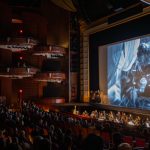 The Atlanta Opera conjures a night of enchantment as Glass’ score reawakens Cocteau’s ‘La Belle et la Bête’ • 20 Nov 2025
The Atlanta Opera conjures a night of enchantment as Glass’ score reawakens Cocteau’s ‘La Belle et la Bête’ • 20 Nov 2025 Jan Lisiecki on discipline, performance psychology, and programming for his Spivey Hall recital • 17 Nov 2025
Jan Lisiecki on discipline, performance psychology, and programming for his Spivey Hall recital • 17 Nov 2025
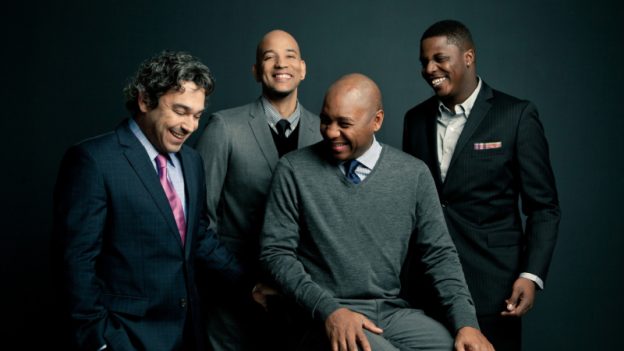
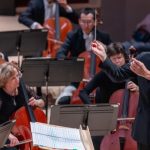
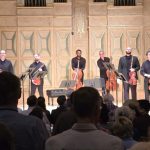
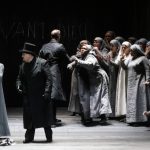
.png)